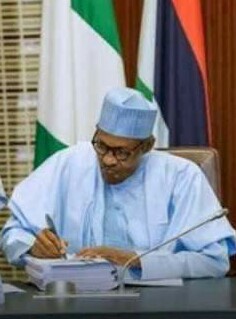
Indications have emerged that the unusual suspicion that trails attempt to amend the constitution will also dog the way of the Omo-Agege Constitution Review Panel.
Some senators on Tuesday listed formidable obstacles to the plan to tinker with the constitution.
The senators expressed concern over the possibility that these predictable constraints may thwart the proposed amendment, owing to the contrasting perception of the items by lawmakers from diverse zones.
The senators said the thorny issues include the lack of consensus on the Land Use Act and devolution of power, which may unsettle the fifth alteration of the 1999 Constitution.
Senate President, Ahmad Lawan inaugurated the 56-member Constitution Review Panel on February 12 with Deputy Senate President Ovie Omo-Agege as the chairman.
Although no date has been fixed for the commencement of the exercise, sources said members of the committee were planning to bring to the front burner certain issues and items dear to them.
It was also gathered that some senators have initiated consultations with opinion leaders in their states and regions for their input.
A member of the committee listed the Land Use Act and the devolution of powers to states as some of the items that “may unsettle the constitution amendment, if not handled carefully.”
Read Also: Constitution review-again!
He said information available to the committee suggested that some members of the Senate and House of Representatives, apparently on the “prompting of highly-placed individuals, were working to tinker with the Land Use Act in favour of the Federal Government.”
The senator, who spoke on condition of anonymity, added: “The scheme of those behind the plot is to amend the Land Use Act to place all land in the country under the Federal Government, contrary to the provisions of the Act, which places land under the control of governors.”
The Eighth National Assembly, under the Fourth Alteration, failed to pass the proposed amendment, which sought the deletion of the Land Use Act from the constitution.
Bill, No. 32, 2017 (Deletion of the Land Use Act from the Constitution) sought to alter the 1999 Constitution to delete the Land Use Act from the Constitution so that it can be subject to the regular process of amendment.
The lawmakers rejected the proposal.
The source said: “It appears that some people with vested interest this time around are determined to push the alteration in the constitution to empower the Federal Government to take charge of land matters in the country.”
On the contentious devolution of power to states, the source noted that some people regard it as “a no go area” that should be left as it is in the constitution.
He said those opposed to the devolution of power “feel that it is restructuring through the back door.”
The Fourth Alteration, under the Eight National Assembly, Bill, No. 3, 2017 (Devolution of Powers) sought to alter the Second Schedule, Part I & II to move certain items to the Concurrent Legislative List to give more legislative powers to states.
It also delineated the extent to which the National Assembly and Houses of Assembly can legislate on the items that have been moved to the Concurrent Legislative List.
The proposal was rejected.
Another proposal which may surface again is Bill, No. 19, 2017 (Separation of the Office of the Attorney-General of the Federation and of the State from the Office of the Minister or Commissioner for Justice.
The proposal sought to alter Sections 150, 174, 195, 211, 318 and the Third Schedule to the Constitution to separate the Office of the Minister or Commissioner for Justice from that of the Attorney-General of the Federation and of states to create an independent Office of the Attorney-General of the Federation and insulate it from partisanship.
It also sought to redefine the role of the Attorney-General, provide a fixed tenure, age and qualification for appointment and also for a more stringent process for the removal of the Attorney-General.
Other issues that may re-appear include: Bill, No. 14, 2017, (Independent Candidacy), which sought to alter Sections 65, 106, 131, and 177 of the constitution.
It is aimed at expanding the political space and broadening the options for the electorate by allowing for independent candidacy in all elections.
Also, Bill, No. 7, 2017 (State Creation and Boundary Adjustment) sought to alter Section 8 of the constitution to ensure that only democratically elected local government councils participate in the process of state creation and boundary adjustment.
It also removed ambiguities in the extant provisions to enhance clarity with respect to the procedure for state creation.
Another is Bill, No. 33, 2017 (Deletion of SIEC from the Constitution). The Bill sought to alter the Constitution of the Federal Republic of Nigeria, 1999 to expunge State Independent Electoral Commission so that INEC takes charge of all elections at the local level.
During the inauguration of the committee, Omo-Agege said the task of the committee would be to find consensus through compromise to meet the ever-changing needs of Nigerians.
The committee, he said, will, no doubt, consider the alteration of the Sixth Schedule to make provision for new items, the establishment of National and State Houses of Assembly, pre-election matters tribunal, governorship pre-election matters tribunals and presidential pre-election matters tribunal, including time limits for the disposal of all pre-election matters before the conduct of the general elections.
He added that the committee will also consider the need for devolution of power, full local government fiscal autonomy, full autonomy of the judiciary in the area of administration of justice, youth inclusiveness in governance, and gender parity or affirmative action.
The Deputy Senate President assured that the committee will consider the recommendations of the 2014 Constitutional Conference and the Governor Nasir El-Rufai-led Committee on restructuring.













